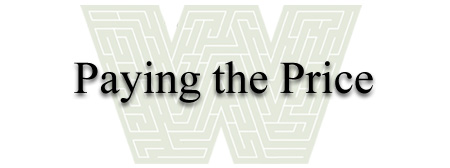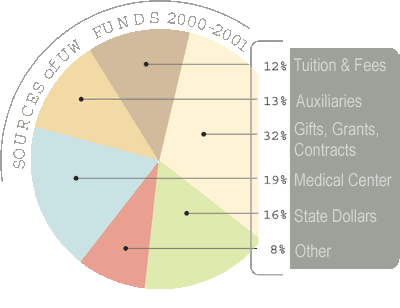
A Quiet Corner of the University
Patterson is optimistic that even more may come our way. "Science in the 21st century is headed toward integrated problem-solving that requires interdisciplinary research. We do that well here. We have pretty low barriers and are able to put together teams across disciplines," he says.
But Huntsman adds that indirect cost revenue is not "fungible," that is, it can't be transferred to activity that falls outside the field of research. It can't be used to hire more TAs for a philosophy course, for example.
With a heavy influence on research grants, there is the potential that undergraduate education will suffer, warns Holt. "Look at the incentive system you are setting up. If you're a professor, do you spend extra time writing up a research grant or extra time on your lesson plans? When you create an incentive system, people are going to respond accordingly."
Private Gifts
Borrowing another page from private universities, the UW hopes to expand private gifts and grants which total $239 million for 2001-02. For example, if it must raise tuition, officials are counting on more private scholarships to cushion the blow and attract students who otherwise could not afford to come here.

Private funds have also helped support new construction on campus, such as the new William Gates Hall for the law school. As the state funding of the capital budget declines, UW leaders are banking on more private support.
At times, a private gift may recruit or retain a top faculty member through a professorship or an endowed chair. With a faculty pay gap of 14 percent compared to its peers—and salaries frozen by the Legislature—private giving is one way the UW can stay competitive.
"Right now is an awful time for investments. Philanthropy is down across the nation. Yet our private gifts and grants are coming in at the same pace as last year-which set a record," notes Patterson. "It is a testament to the strength of the commitment this community has to the University."
"We would like private philanthropy to play an even larger role. But at what point does reliance on private donors compromise our freedom to choose our own intellectual and educational directions?" the President asks.
Private gifts are not a panacea. About 99 percent of all gifts are restricted. The UW is obligated to spend the money where the donor has asked for it to be spent. That rule applies to the $1 billion endowment the UW currently holds. "It helps, but it is not going to replace core funding," says Holt.
Self-Sustaining Programs
A quiet corner of the University is its self-sustaining educational offerings—everything from Summer Quarter to distance learning to the Executive M.B.A. program. Academic units realize that in this climate there will be little or no state funding for new education programs. Many are now considering offerings that will pay for themselves.
Some recent examples include the distance learning master's degree offered by the School of Information, computing certificate programs from Educational Outreach, or management and financial risk programs from the business school.
"It is a chance to get programs out to people that we wouldn't otherwise be able to reach," explains Patterson. But it can only marginally aid a unit that is strapped for cash. "This is a way to enable good ideas to come forward," explains Huntsman, "It is not a way to float your budget."
Too many self-sustaining programs could fracture the UW's overall mission, adds the President. "At what point, going down that road, do we risk losing a sense of common goals and purposes?" he asks.
Expect some controversy if state-funded offerings are shifted to self-supporting status, adds Holt. "All of a sudden you are a for-profit segment of the University," he explains. "You are trying to make as much money as you can for your program. Your job then depends on student interest and charging tuition." Tougher courses-and tough grading-could suffer in the push to make a profit, he warns.
- Page 5: Looking to the Future
- Sidebar: Ups & Downs: Futures in UW Funding
- Return to September 2002 Table of Contents